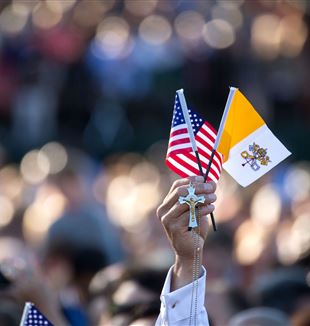
Hauerwas, a Protestant: “I Would Like to Have Said Those Things Myself”
Fifty teachers from North American universities measured themselves against Fr Giussani’s educational proposal.Could you comment on education in America–both in general and at the institutional level–as informed by your reading of The Risk of Education?
America, though oftentimes identified as one of the more religious cultures still in existence, is much more determined by the secular than is Italian culture. I know that sounds extremely odd, but in Italy, Christianity is in the stones, and in America, we have no stones. The Christianity in America is not thick in practices that actually form bodies to understand better what it means to be Christian. And that has everything to do with the kind of Protestantism that shaped American society, which both produced and has then been reproduced by a certain understanding of the relationship with God that is gnostic in character. By that I mean people in America that are religious think that they have a relationship with God, which they go to church to have expressed. It doesn’t occur to them that the only relationship with God that you can have–at least the God that we Christians worship–is through the mediation of the church. So it simply becomes unthinkable for Americans to think that outside the church there’s no salvation when in fact that’s true: outside the church there is no salvation. The mediated character of Christianity is simply unknown and that means your educational task is not surrounded by the kind of thick practices that are necessary to sustain it (as any serious business).
At the institutional level, America has hundreds, literally hundreds, of Christian schools, Christian colleges, Christian universities. Most of them wouldn’t have the slightest idea of how to own what it means to be Christian. I teach at Duke, which was established by Methodists. We have a huge chapel that’s extraordinary, absolutely gorgeous. The President of Duke says that the Duke chapel is a symbolic gesture to remind us of the spiritual dimension of all knowledge. That God might have anything to do with it isn’t even on the table. I think that the institutions of America that think of themselves as Christian do pretty much what secular institutions do. They just say they’re more concerned about the student.
How would you approach that issue?
One of the people at the conference spoke about home schooling. I do think that that’s a real movement in America and we’ll see how that works out. Also, Catholics, for example, have founded a new institution in Michigan called Ave Maria College. I think it’s got a chance to be an institution that can be serious about the Christian formation of knowledge. That’ll be a terrific kind of development because we need examples. We don’t have any idea what a Christian school would look like.
What implications do you see for the role of the teacher in America based on what Giussani is saying?
Well, it has to do with the politics of the classroom. Remember, when you are teaching in America you are going to have in your classroom secularists, Muslims, Jews, and Christians who don’t know very much about Christianity. And so the teachers, insofar as they think they’re about moral formation, will say, “Our function is to help clarify your values.” The way it’s done, insofar as it’s done, is through the students observing what the teachers really care about.
Given what you’ve described of these educational contexts, what aspects of the American culture do you see as either hindrances or positive points that might be leveraged?
The deepest hindrance is capitalism. We are a consumer culture and therefore Christianity is seen as just one more possible consumer item you might buy that gives you a lot of meaning. That’s deeply antithetical. It’s very hard therefore to form disciplined communities once you’ve got that in the game. Forms of the culture that might be appropriate are the other side of that kind of picture and that is quite simply that people are destroyed by their choices. And so people discover that one of the worst things in life is to get what you want, and it destroys them. We Christians have a way to say, “Yeah, you know, we understand that, because we’ve all been through it, because we were created to want God and we deny that. And when we deny that, our lives go to hell in a hand basket.” I think that knowledge is a resource that is very deep and I think, also, that we Christians are happy. That is, we’re blessed to be a people who have been gifted and are able to receive those gifts without resentment. And I hope that that will attract other people.